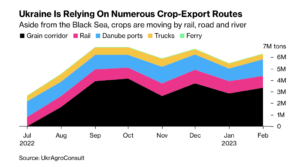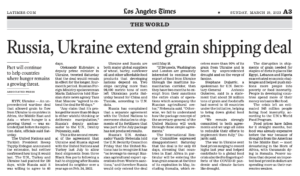A prolonged military conflict in the Middle East could potentially upend key commodity markets due to Iran’s control of the Strait of Hormuz, one of the world’s most important trade…
Black Sea Grain Initiative Extended- “Uncertainty Surrounds The Duration”
Financial Times writer Ben Hall reported yesterday that, “A deal allowing Ukraine to export grain to world markets by ship despite Russia’s blockade of the Black Sea has been extended, the UN and the Ukrainian and Turkish governments said on Saturday.
The Black Sea Grain Initiative, signed in Istanbul on 22 July 2022, has been extended: https://t.co/TUXqVEIYxM
— UN Spokesperson (@UN_Spokesperson) March 18, 2023
“The Black Sea grain initiative, agreed in July under the auspices of the UN and with Turkish mediation, has enabled Ukraine to ship 25mn tonnes of grain and edible oils, easing pressure on global food prices.
“Oleksandr Kubrakov, Ukraine’s deputy prime minister responsible for infrastructure, said in a tweet that the agreement had been extended for 120 days.”
The FT article added that, “However, Moscow indicated it had only agreed to a 60-day extension. Russian foreign ministry spokeswoman Maria Zakharova re-posted a letter it had sent to the UN earlier this week, saying it was only willing to extend beyond 60 days if there was ‘tangible progress’ in unblocking flows of Russian food and fertiliser to world markets.
“The UN confirmed the deal had been rolled over but did not specify for how long, as did Turkish president Recep Tayyip Erdoğan.”
The Black Sea Grain Initiative, a UN-brokered deal which has allowed continued exports of food and fertilizer from Ukraine and Russia, was extended on Saturday, the day it was due to expire.https://t.co/Jmpkv86ToD
— UN News (@UN_News_Centre) March 19, 2023
Hall explained that, “The original agreement struck last year specified that it would continue automatically for 120 days if no party objected. Ukraine, Turkey and the UN backed a full extension. Kyiv says a 60-day extension creates too much uncertainty for grain dealers and shippers.”
The Black Sea Grain Initiative has improved global food security by moving over 24 million metric tons of lifesaving food supplies to global markets. Ukrainian grain is reaching millions in need, including here in Africa. pic.twitter.com/aSZSkoKS7I
— Secretary Antony Blinken (@SecBlinken) March 15, 2023
The FT article added that, “Ukrainian officials have complained that Moscow has been undermining the deal by ordering its officials to drag out inspections of Ukrainian ships as they leave the Black Sea for the Bosphorus. Russian inspectors were ordered to work shorter hours and take longer with each ship, delaying scores of ships for weeks, Kyiv claimed.”
Also yesterday, Bloomberg writers Megan Durisin, Daryna Krasnolutska and Selcan Hacaoglu reported that,
A agreement that allows Ukraine to export grains and other crops from key Black Sea ports has been renewed, although uncertainty surrounds the duration of the latest extension.
“While Ukraine Infrastructure Minister Oleksandr Kubrakov on Saturday — the last day of the deal’s current run — said the pact had been prolonged for another 120 days, Russian Foreign Ministry spokeswoman Maria Zakharova told RBC newswire that Moscow had only agreed to a 60-day extension and had alerted all parties.”

Reuters writers Huseyin Hayatsever and Michelle Nichols reported yesterday that, “The United Nations and Turkey said on Saturday that the deal had been extended, but did not specify for how long. Ukraine said it had been extended for 120 days. But Russia’s cooperation is needed and Moscow only agreed to renew the pact for 60 days.”
New York Times writers Shashank Bengali and Victoria Kim reported in today’s paper that, “Though the agreement was a rare diplomatic breakthrough between Ukraine and Russia since the war began, Moscow has held the deal hostage at various points. In late October, the Kremlin abruptly suspended its participation after an attack on its warships in the port of Sevastopol, but it rejoined a few days later.”
And Wall Street Journal writers James Marson and Jared Malsin reported on Saturday that, “The continued squabbling over the length of the extension is not expected to disrupt the flow of grain from Ukraine.”

Associated Press writer Karl Ritter reported in today’s Los Angeles Times that, “Ukraine and Russia are both major global suppliers of wheat, barley, sunflower oil and other affordable food products that developing nations depend on. Two ships carrying more than 96,000 metric tons of corn left Ukrainian ports on Saturday bound for China and Tunisia, according to U.N. data.”





